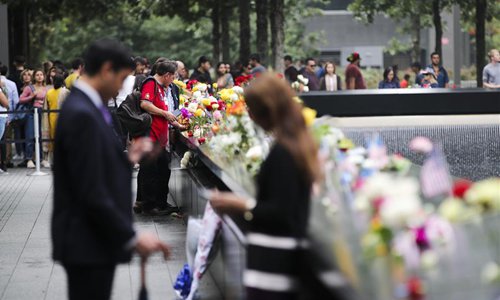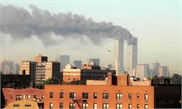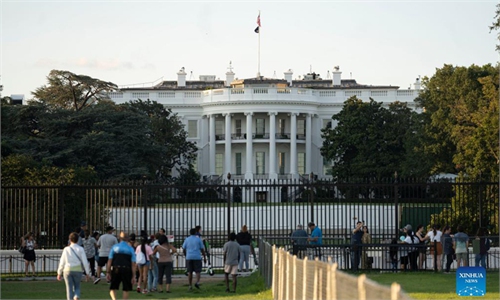Specter of terrorism may haunt US again if Washington fails to learn lessons from the past

People pay tribute to victims beside plates on which the names of 9/11 victims were inscribed around the North Pool at the National September 11 Memorial and Museum in New York. Photo: Xinhua
Soon the world will commemorate 20 years since the 9/11 attacks. This harrowing event by Al Qaeda operatives under the command of Osama bin Laden was the deadliest terrorist attack against civilians on American soil in its history. It saw the deaths of nearly 3,000 with more than 6,000 wounded. The hijacked civilian airliners crashed into a number of targets in the US, including most notably the Twin Towers of the World Trade Centre in New York City.
This was a watershed moment that permanently changed the world, unleashing the War on Terror from the George W. Bush administration, which led to retaliatory wars in Afghanistan and Iraq.
The course of events had led many to speculate as to whether a "Clash of Civilizations" between the "West" and the "Islamic World" was now underway, as famously narrated by Samuel L. Huntington's Book of the name in 1996, which argued people's cultural and religious identities will be the primary source of conflict in the post-Cold War world. For the space of the next two decades, radical Islamism was subsequently defined as the primary "threat" to the US, which also accumulated in a broader policy of attempting to spread democracy and American throughout the Middle East, leading to further conflicts in Libya and Syria.
But even as America now aims to close the door on this violent saga, precisely two decades on from 9/11, as it hastily withdraws from Afghanistan, its run in with the Islamic World is not over. As for a matter of fact, there was never truly a "clash of civilizations" but only a militant reaction to how American imperialism has, over the course of decades, upheaved, subjugated, divided and desolated the Middle East and Islamic World. This has created a vicious cycle of conflict and radicalization wherein the US response to each crisis only lays the foundations for the next. US President Joe Biden is aiming to break the link to focus on China, but there is little inclination he will succeed as we are now discovering with the ISIS attacks.
Islamist movements are not, contrary to Western orientalist belief, a product of culture or civilization in Muslim countries. They are like all political forces, a product of the socio-economic context which creates them. Following the failure of secular nationalist regimes in the Middle East, occupation of the region by American troops and its backing for Israel, Islamism as we know it in fact emerged in the 1970s and 1980s. It is a modern reaction to US hegemony.
But this is what Washington has never understood. The rise of terrorism and extremism is not because of "evil people" in light of how America's narratives frequently depict the world, but is a product and reaction toward their own violence meted out toward other countries. For one, it has always been lost on the US psyche that the rise of Al Qaeda and ISIS in Iraq and Syria was a consequence of their own brutal invasion and regime change in that specific country, which unleashed stability and chaos in attempting to impose a political system upon it that was ill suited to their own political realities. The result was that it created a vicious cycle of perpetual war and radicalization.
Yet this is only one example; the CIA led deposing of democracy in Iran in 1953 which created the conditions that led to the Iranian Revolution in late 1970s; America's weaponization of Islamism as an anti-communist force in Afghanistan would establish the Taliban; America's backing of regime change efforts in Libya and Syria, as well as its unconditional support of Israeli aggression, would further amount to the rise of extremist groups.
All around the world, America's own reckless and bombastic foreign policy has not articulated a "clash of civilizations" but accumulated in the proliferation of violent groups through political, social and economic destabilization.
In this case, as Biden claims to draw the curtains on Afghanistan and the War on Terror, there is little evidence that lessons "truly have been learnt" or that anything can truly change. The closing events of ISIS led attacks against US targets and further retaliatory airstrikes, the unapologetic killing of civilians in the process, as well as a pledge for more bombing by allies such as Britain, are a reminder that the "perpetual war" really isn't over, and the vicious cycle will continue. These groups and their actions are America's own Frankenstein's Monster, a creation of their making which spins out of control.
There would be no ISIS without America's War on Iraq, showing how these foreign policy disasters are not just something that can be abandoned on a whim, but have lasting consequences, and in this case, as trigger-happy Republicans subsequently brand Biden as weak and eye up more revenue for the war machine, it is only inevitable that history will repeat itself yet again. The specter of terrorism will come back to haunt America again.
The author is a political and historical relations analyst. opinion@globaltimes.com.cn



